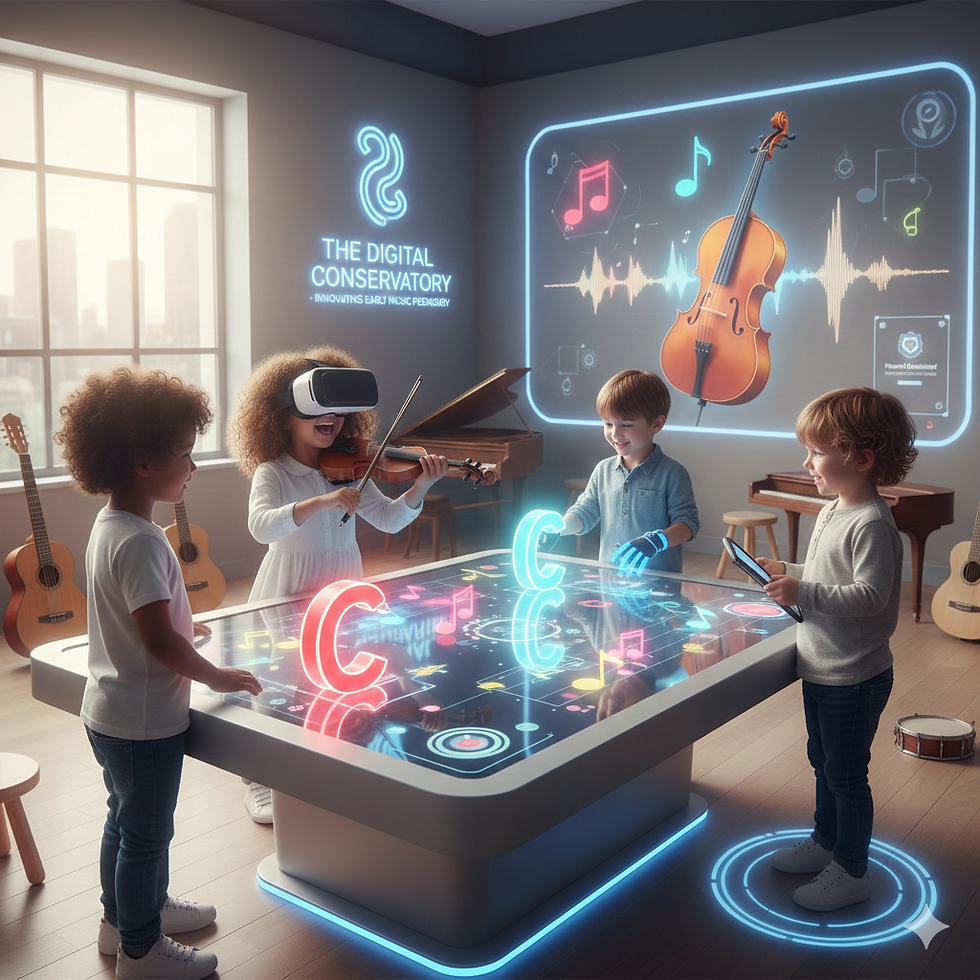The Musician's Secret Toolkit: Writing, Reflecting, and Connecting
- Jul 25, 2025
- 4 min read
Updated: Aug 4, 2025
As music learners, we often zero in on the tangible: mastering scales, perfecting techniques, and deciphering complex harmonies. But what if I told you that some of the most profound growth happens off the instrument, in moments of quiet reflection and the vibrant world of connection?
Today, let's explore how music writing, contemplation, tweeting (and other social sharing), and social and emotional learning aren't just side activities, but powerful tools to deepen your musical understanding, spark creativity, and enrich your entire journey.

Music Writing: Your Personal Sonic Diary
We're not talking about composing a symphony here (unless you want to!). Music writing, in this context, is about journaling your musical experiences, thoughts, and feelings. Think of it as a personal notebook for your musical mind.
Document your practice: What did you work on today? What challenges popped up? What breakthroughs did you have? This helps you track progress and spot patterns.
Explore your inspirations: What music truly moves you? Why? Analyze the elements that resonate and consider how you might weave them into your own playing or future compositions.
Process emotions through sound: Music is a powerful emotional outlet. Write about how a particular piece makes you feel, or even try to translate a complex emotion into a musical idea — a melody, a rhythm, a chord progression.
Dream big (or small): Jot down ideas for new pieces, performance concepts, or even just a cool riff that randomly came to you. No idea is too silly or insignificant.
Why it matters: Music writing turns fleeting thoughts into concrete observations, helping you understand your own musical psyche better. It's a powerful tool for self-reflection and can even spark exciting new creative directions.
Contemplation: Finding Your Inner Melody
In our fast-paced world, finding time for quiet contemplation can feel like a luxury. But for musicians, it's essential.
Active Listening (without your instrument): Put on a piece of music and just listen. Don't analyze, don't judge; simply experience it. What emotions does it stir? What images come to mind?
Visualize your goals: Before a practice session or a performance, take a few moments to visualize yourself successfully hitting your goals. This mental rehearsal can significantly boost your performance.
Reflect on your musical journey: Where did you start? How far have you come? What are your aspirations? This can be incredibly motivating and help you truly appreciate your progress.
Embrace silence: Sometimes, the most profound musical insights come when there's no sound at all. Let your mind wander, connect disparate ideas, and simply be with your musical self.
Why it matters: Contemplation helps you step back from the technicalities and connect with the deeper, more intuitive aspects of music. It fosters mindfulness, eases performance anxiety, and allows for genuine creative breakthroughs.
Tweeting (and other Social Sharing): Amplifying Your Voice and Connecting Your Tribe
In the digital age, sharing your musical journey online is more than just broadcasting; it's about building community and learning from others.
Share your progress: A short video of a tricky passage you've nailed, a snippet of a new composition, or even just a text update on your practice routine can be incredibly motivating for you and inspire others.
Ask questions and seek advice: The online music community is vast and supportive. Don't be shy about asking for feedback, advice on a specific technique, or recommendations for new music.
Discover new artists and resources: Follow musicians, educators, and music organizations who inspire you. You'll unearth new genres, learning materials, and perspectives.
Celebrate others: Engage with and support your fellow music learners. Liking, commenting on, and sharing their content creates a positive and encouraging environment for everyone.
Why it matters: Sharing on platforms like X (formerly Twitter) breaks down isolation, provides external motivation, and opens doors to new learning opportunities and collaborations. It's a fantastic way to both showcase your work and learn from a global community.
Social & Emotional Learning (SEL): The Heart of a Musician
SEL is about developing the self-awareness, self-management, social awareness, relationship skills, and responsible decision-making that are crucial for success in life — and in music!
Self-awareness: Understanding your strengths and weaknesses as a musician, recognizing your emotional responses to challenges, and knowing when to push yourself and when to rest.
Self-management: Developing discipline in practice, handling performance anxiety, setting realistic goals, and sticking with it through setbacks.
Social awareness: Understanding the role of music in different cultures, empathizing with the emotions conveyed in music, and appreciating diverse musical perspectives.
Relationship skills: Collaborating effectively with other musicians, communicating clearly in rehearsals, and building positive relationships within the music community.
Responsible decision-making: Choosing repertoire wisely, making ethical choices about your musical endeavors, and understanding the impact of your musical decisions.
Why it matters: Music is inherently social and emotional. Developing strong SEL skills not only makes you a better musician but also a more resilient, empathetic, and well-rounded individual, capable of truly connecting with your art and your audience.
So, the next time you pick up your instrument, remember that your musical journey goes far beyond just the notes. Embrace music writing, contemplation, social sharing, and cultivate your social and emotional intelligence. These practices won't just improve your technical skills; they'll unlock deeper levels of creativity, resilience, and connection, transforming you into a truly holistic and expressive musician.
What's one thing you'll try this week to fuel your musical growth beyond your practice routine?



Comments